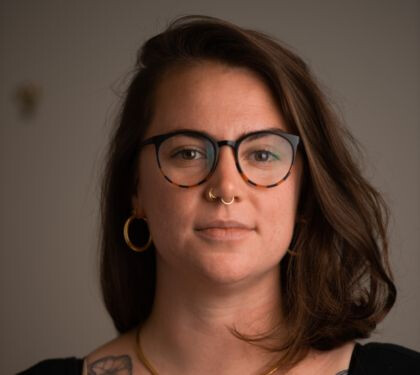Connecting Farmers with Conservation and Community through NRCS Partnership
For Erinn Roberts, it all started with a green bean. Now, 20 years later, as an Implementation Specialist at American Farmland Trust (AFT), she helps farmers in Southeastern Massachusetts adopt more environmentally friendly practices and secure federal funding to implement them. Before joining AFT, she spent a year with the USDA’s Farm Service Agency, a sister agency to NRCS.
But back to the bean: Years ago in West Philadelphia, Erinn volunteered on a small farm and realized, “Oh, this is a thing people can do… ok!” Shortly after, she and her now husband found themselves in Central California’s Northern Valley during the 2000s when organic farming was on the rise. They had an immersive experience at farmers markets across Lake Tahoe and Davis and learned everything they know about farming on a small, five-acre mixed vegetable and olive oil farm. The farmers there played a crucial role in forming the California Certified Organic Farmers (CCOF), one of the early organic certifying agencies.
Over the years, Erinn and her husband farmed in Oregon and Massachusetts, balancing high-intensity production with educational and community-focused programs. These diverse experiences gave her a unique perspective on both large-scale production and community-oriented farming, providing a solid foundation for her current position.
Bridging Gaps and Building Trust as an Implementation Specialist
Erinn’s day-to-day work varies greatly, from administrative tasks like calling farmers to check on their contracts, assisting with vendor contacts for irrigation, and helping with certification paperwork to conducting farm visits to inspect and certify completed practices and offering integrated pest management and irrigation ideas.
“It was hard to envision what else to do after 20 years of [farming],” Erinn reflects. “As a farmer, you know there are a lot of transferrable skills, but do other people that are hiring know that? AFT/NRCS recognizes that in a way that I really appreciate. I don’t think I envisioned doing this [type of work] necessarily, but partially because I [didn’t know] it could be out there.”
In Southeastern Massachusetts, she primarily works with cranberry farmers. This industry is generational, with a long history attached to many farms. Despite being second or third-generation farmers, everyone is learning how to be responsive to current climate challenges, which may be different from what they grew up seeing their parents do.
“Whether or not a farmer attributes it to climate change or not, they’re hyper-aware of what’s going on more than anyone else. That doesn’t necessarily make it easier or less scary for people to change their systems or try different things. That’s why I really appreciate the cohorts at AFT for people to have a little more community around rather than feeling isolated. Even just having a sounding board is helpful, and you see a lot more attention being paid to farmers’ mental health. Those sorts of cohorts can be tremendous in that realm.”
Water management is also a significant concern for farmers today. The New England Regional team’s efforts have been extremely helpful, particularly their research on farmers’ practices in response to extreme moisture and precipitation. Their approach acknowledges farmers as experts in their field, and combining this with focused research provides a comprehensive foundation to support organizations like NRCS with their programs.
Erinn values the opportunity to plug farmers into this work, bridging the gap of valuable insights from both AFT and NRCS. She emphasizes, “Knowing that there is this cadre of people who can be very helpful on the AFT side of things, this has been more of the direct link between AFT and NRCS. Making those connections does still feel useful – to know that there are people building resources for farmers, [ensuring] they feel like they really are being listened to and that we’re a reliable resource.”
Looking Ahead
Erinn aims to reduce the workload on NRCS staff and increase outreach to farmers unaware of available resources. “There’s a lot of IRA (Inflation Reduction Act) money and funding for conservation,” she explains, “and the opportunity for that to be introduced to people who historically haven’t had access to it, haven’t heard about it, or just don’t know enough to feel comfortable stepping a foot through a door is something that I’m really interested in.”
While Erinn remains dedicated to protecting and conserving farmland in Southeastern Massachusetts, a part of her still longs to return to farming. However, she appreciates the current flexibility and the release of anxiety that comes with not farming. “I feel happy riding it out now and also feel like it’ll be my future again, too.”





